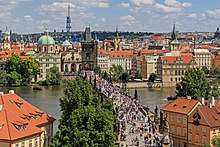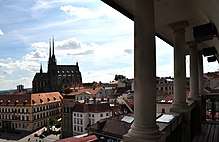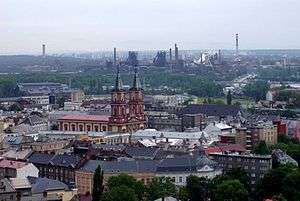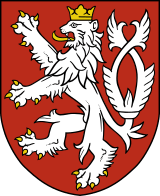Statutory city (Czech Republic)
In Czech politics, a statutory city (Czech: statutární město) is a municipal corporation which has been granted city status by Act of Parliament. It is more prestigious than the simple title město ("town"), which can be awarded by the cabinet and chair of the Chamber of Deputies to a municipality which applies for it. Statutory city status is partially ceremonial; the mayor is called primátor, rather than the starosta of other municipalities. Statutory cities are allowed to subdivide into self-governing boroughs (sg. městský obvod or městská část) with their own elected councils; such a statutory city has to issue a statute (statut) that delimits power to boroughs. As of 2016 only seven of then total 25 statutory cities have done so. Also the capital of Prague, while not being de iure statutory city, is subdivided into similar self-governing boroughs.

History
The model, derived from its common origin in Austria-Hungary, was renewed after the fall of communism by the Act on Municipalities in 1990, which established 13 statutory cities in addition to Prague, the capital city which is a de facto statutory city. Unlike Austria, before districts of the Czech Republic were abolished only the three largest cities (Brno, Ostrava and Plzeň) constituted a district okres on their own; the others were a part (though always a capital, except Havířov) of a district with smaller municipalities. As the prestige associated with statutory city status grew, 12 additional statutory cities were created by the Act on Municipalities in 2000[1] and its four later amendments.
There are only two statutory cities, Havířov and Třinec, that are not seats of their eponymous districts.
List
Since August 2018, there are 26 statutory cities (plus Prague), comprising all Czech cities over 40 thousand inhabitants (and Třinec):
| Name | Population[2] | Area (km²) | Region | Statutory city since |
|---|---|---|---|---|
| 1,324,277 | 496 | Prague | “time immemorial” | |
| 381,346 | 230 | South Moravian | 1990 | |
| 287,968 | 214 | Moravian-Silesian | 1990 | |
| 174,842 | 138 | Plzeň | 1990 | |
| 104,802 | 106 | Liberec | 1990 | |
| 100,663 | 103 | Olomouc | 1990 | |
| 94,463 | 56 | South Bohemian | 1990 | |
| 92,939 | 106 | Hradec Králové | 1990 | |
| 92,716 | 94 | Ústí nad Labem | 1990 | |
| 91,727 | 78 | Pardubice | 1990 | |
| 74,935 | 119 | Zlín | 1990 | |
| 71,200 | 32 | Moravian-Silesian | 1990 | |
| 69,337 | 37 | Central Bohemian | 2000 | |
| 66,034 | 87 | Ústí nad Labem | 2000 | |
| 56,450 | 91 | Moravian-Silesian | 1990 | |
| 55,557 | 52 | Moravian-Silesian | 2006 | |
| 52,128 | 57 | Moravian-Silesian | 2003 | |
| 51,216 | 79 | Vysočina | 2000 | |
| 49,731 | 24 | Ústí nad Labem | 2003 | |
| 48,635 | 29 | Ústí nad Labem | 2006 | |
| 48,594 | 118 | Ústí nad Labem | 2006 | |
| 48,479 | 59 | Karlovy Vary | 1990 | |
| 45,773 | 31 | Liberec | 2012 | |
| 44,740 | 29 | Central Bohemian | 2003 | |
| 43,651 | 39 | Olomouc | 2012 | |
| 42,871 | 59 | Olomouc | 2006 | |
| 35,002 | 85 | Moravian-Silesian | 2018 |
References
- Act on Municipalities (2000); Předpis č. 128/2000 Sb. Zákon o obcích (obecní zřízení) (in Czech)
- "Population of Municipalities – 1 January 2020". Czech Statistical Office. 2020-04-30.

_-_Velk%C3%A9_n%C3%A1m%C4%9Bst%C3%AD.jpg)

